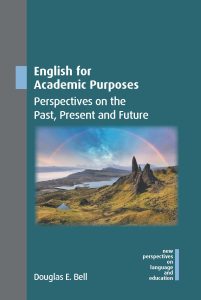Professor Douglas Bell, author of a recent book ‘English for Academic Purposes. Perspectives on the Past, Present and Future’ reflects on a quarter century of his international involvement in EAP.

My professional involvement in the field of English for Academic Purposes dates back to the late 1990s, when I accepted a position as an EAP tutor and textbook writer at Bilkent University in Türkiye.
While it is now quite sobering for me to reflect that this first foray into EAP took place more than a quarter century ago, I might also conclude that in many ways I have never looked back. Since that time, I have gone on to hold a wide variety of EAP-related positions in the UK, Australia, and most recently, the Peoples’ Republic of China.
What this very long involvement in EAP has given me is a genuine and abiding personal and professional interest in the different ways in which the field has developed, the various issues and challenges it has faced and the likely direction of its future travel.
My ongoing critical reflections on each of these areas originally inspired my doctoral thesis, ‘Practitioners, Pedagogies and Professionalism in English for Academic Purposes (EAP): The Development of a Contested Field’ and have more recently prompted me to write a new book, ‘English for Academic Purposes. Perspectives on the Past, Present and Future’.
In this short article, I will discuss several of the themes my book explores and as the title ‘Quo Vadis, EAP?’ suggests, open the wider question of where EAP as a discipline might be heading.
Perhaps one of the first things I should say is that one of the more forgiving aspects for anyone attempting to chart the historical development of EAP is that, thanks to the field still being relatively young, the task of mapping out its trajectory remains reasonably manageable.
When I was carrying out the research for my doctoral thesis, for example, I had been keen to gather the views of key individuals who had been involved in EAP teaching across the entire range of its history. I had therefore settled on 15 high profile international participants grouped to represent four different decades: the ‘60s to ‘70s; ‘70s to ‘80s; ‘80s to ‘90s; and finally the ‘90s up to present day.
In a series of qualitative interviews, each participant was duly asked to share their experiences of teaching EAP, their motivations for joining the field in the first place, the things that they felt might make EAP different from other forms of English Language Teaching, the knowledge, skills and competencies that they would consider necessary in order for someone to claim expertise, the role of EAP-specific qualifications, the importance of continuing professional development, and finally, their views on where EAP as a discipline ultimately might be heading.
The rich qualitative data which emerged from these interviews duly formed the backbone of my doctoral thesis and allowed me to make several claims about the nature of EAP expertise, pedagogy and professional practice.
In 2023, some seven years on from the completion of my PhD, I decided that it might be interesting for me to revisit some of those claims and try to gather more updated perspectives. The interviews I subsequently carried out with three of my original informants have thus helped to inform many of the critical perspectives I now share in my book.
In terms of EAP’s developmental trajectory, I must say that one of the things which came as quite an eyeopener for me was the highly recursive nature of the field. While delving into the very early academic literature, for example, I was surprised to find that several issues which had been flagged as problematic and in need of urgent attention in the 1970s, ’80s and ‘90s are still being talked about today. This suggests a very strong sense of history repeating itself and, in a few cases, the same wheels being reinvented.
I speculate on some of the possible reasons for this in my book, but it seems to me that the ongoing lack of standard entry routes into EAP and recognised preparatory benchmarks and qualifications are probably a major contributor. After all, if there is no universally-shared picture of what EAP now is, or how one should formally train to become a practitioner, then it stands to reason that the knowledge and skills base of the discipline will continue to be patchy and contested.
This is not to suggest of course that disciplinary knowledge should in any way be monolithic or expected to remain static, but unless there is an agreed collective understanding of a discipline’s history, the challenges it has faced in its development and the various skillsets that qualified practitioners are supposed to possess, it then begs the question of how new entrants should go about developing their knowledge, skills and expertise. In most professional walks of life, after all, in order for people to know where they are going, it is first necessary for them to learn about where they have come from.
In this regard, most other established professions do generally tend to have an agreed knowledge base with clearly marked pathways for new entrants. It is universally recognized, for example, that someone wishing to become a doctor, a dentist, an engineer or a lawyer must first complete a series of professional qualifications and go through a standardized cycle of preparation.
In the case of EAP, however, this is still very far from the case with entry points to the discipline continuing to remain vague and mostly unregulated. As I discuss at length in my book, it can be argued that this vagueness and permeability of EAP as a field has had several unfortunate knock on effects with regard to its wider status and how it is perceived vis a vis other disciplines in the academy.
Another point I would like to stress about EAP is that like many other disciplines within Higher Education, it is currently in a state of considerable flux. As I discuss in my book, this contemporary period of EAP’s development continues to be impacted by global issues such as the pandemic, the massive recent expansion of artificial intelligence, changing attitudes to the role of Higher Education in general and widely fluctuating trends around international student mobility.
In the UK context, the significant expansion of private EAP providers in recent years has been another significant change to the previous landscape and important questions still remain on the wider effects that this will continue to have on EAP’s recognition and status within the academy.
By necessity, this very short article has naturally only scratched the surface of the many important issues currently facing EAP. However, in closing, I would reiterate my strong belief that the six or so decades of EAP’s existence do represent extremely rich ground for discussion and critical analysis. I hope that the different perspectives I share in my new book will stimulate further thinking and prove to be a catalyst for this.
‘English for Academic Purposes’ is available to purchase on Multilingual Matters.







